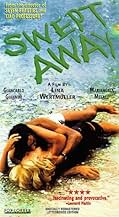IMDb RATING
7.5/10
7.2K
YOUR RATING
A trip into the Mediterranean sea becomes a trip into the discovery of how society's frameworks of the rich and poor are delicate and temporary.A trip into the Mediterranean sea becomes a trip into the discovery of how society's frameworks of the rich and poor are delicate and temporary.A trip into the Mediterranean sea becomes a trip into the discovery of how society's frameworks of the rich and poor are delicate and temporary.
- Awards
- 4 wins & 4 nominations total
Featured reviews
Swept Away (1974)
**** (out of 4)
Rich woman Raffaella Lanzetti (Mariangela Melato) and her servant Gennarino Carunchio (Giancarlo Giannini) end up being taken away from their boat as the current sweeps them away and onto a deserted island. Now that the tables are turned and her money isn't going to save her, Gennarino plans to teach the woman a lesson about life. Lina Wertmuller's SWEPT AWAY has been called a masterpiece by many, a evil picture by some and there are certainly some that fall somewhere in between. I think the reason there are so many mixed reviews of this film is that it's so hard to fully put your hands on it. I mean, a hundred different people could attend a screening of this film and then afterwards each of them would see something different. Is it a drama? It is a political message about living conditions between the rich and poor? Is it some sort of dark comedy where the poor man gets his day in the sun? SWEPT AWAY is a film I really loved watches even if parts of it certainly rubbed me the wrong way. The opening twenty-minutes or so clearly set up that this rich woman is rather heartless, cruel and uncaring about anyone other than herself. When she gets lost at sea you're happy to see her get a dose of reality but at the same time I can't say I enjoyed how she got it. There were times where the man physically abuses her and I must admit that this didn't make me care for him any or cheer for him to "teach" the rich woman. Yet, the film takes these ugly moments and does stuff with them that most films wouldn't dare try, nevermind actually making them work. Another rather remarkable thing is how much you can believe what you're seeing. I'm not going to ruin what actually happens but director Wertmuller really makes you believe it from start to finish and talk about the perfect ending. The film contains some very harsh language and some ugly violence but in its own pay these scenes are rather poetic. Another major plus is that both Melato and Giannini turn in two of the greatest performances you're going to see. Both of them were simply terrific in their roles and even when the tables are turned, both of them are believable and really sell the fire and passion of the story. SWEPT AWAY is a very unique film that's quite unlike any other including the countless imitations that have been released. The film manages to work on so many levels and it's greatness is also what many might see as ugliness.
**** (out of 4)
Rich woman Raffaella Lanzetti (Mariangela Melato) and her servant Gennarino Carunchio (Giancarlo Giannini) end up being taken away from their boat as the current sweeps them away and onto a deserted island. Now that the tables are turned and her money isn't going to save her, Gennarino plans to teach the woman a lesson about life. Lina Wertmuller's SWEPT AWAY has been called a masterpiece by many, a evil picture by some and there are certainly some that fall somewhere in between. I think the reason there are so many mixed reviews of this film is that it's so hard to fully put your hands on it. I mean, a hundred different people could attend a screening of this film and then afterwards each of them would see something different. Is it a drama? It is a political message about living conditions between the rich and poor? Is it some sort of dark comedy where the poor man gets his day in the sun? SWEPT AWAY is a film I really loved watches even if parts of it certainly rubbed me the wrong way. The opening twenty-minutes or so clearly set up that this rich woman is rather heartless, cruel and uncaring about anyone other than herself. When she gets lost at sea you're happy to see her get a dose of reality but at the same time I can't say I enjoyed how she got it. There were times where the man physically abuses her and I must admit that this didn't make me care for him any or cheer for him to "teach" the rich woman. Yet, the film takes these ugly moments and does stuff with them that most films wouldn't dare try, nevermind actually making them work. Another rather remarkable thing is how much you can believe what you're seeing. I'm not going to ruin what actually happens but director Wertmuller really makes you believe it from start to finish and talk about the perfect ending. The film contains some very harsh language and some ugly violence but in its own pay these scenes are rather poetic. Another major plus is that both Melato and Giannini turn in two of the greatest performances you're going to see. Both of them were simply terrific in their roles and even when the tables are turned, both of them are believable and really sell the fire and passion of the story. SWEPT AWAY is a very unique film that's quite unlike any other including the countless imitations that have been released. The film manages to work on so many levels and it's greatness is also what many might see as ugliness.
What marvelous Italian sensibility! Italians have to be muted for drama, but give them comedy and they soar, it's who they are, who we are in general down South and all over the Mediterranean - boisterous, frivolous, yelling past each other out of some need to stay afloat, lest the silence bogs us down.
The allegory is of course as obvious as the characters, a shrill rich wife and a grumbling sailor, a communist we're told, on board her yacht during a cruise get stranded in a deserted island. Of course the dynamics shift - we see how easy and quick it is for him to become a tyrant now that he has the upper hand, how degrading for her to be ordered about. But then sex enters the picture and that changes everything; she's beaten around, almost raped and comes to love the submission.
As thin as the politics may be, so much more subversive when it becomes sexual. Rape fantasies are common in men and women alike, no reason to hide, and nothing peculiar about it - sex is after all in a primal way about the swap of power. But here just as about the fantasy is about to be consummated, at the peak of sexual paroxysm, this is the moment the filmmaker chose to have the man pull back and be revealed a delusional fool - she must cherish him as her god and so on.
The question that looms, a deep deep one, is was it the island? Or is it civilization that obscures? Which of the two shows their true self? Eventually they bond as lovers, but that is based on everything else we've seen. Do the limits imposed by being seen and known in public lead into delusions of self? Or does uninhibited freedom? Was it true love or was it a simple desire that found no limits to run up against? Who's to make all these impositions of truth anyway?
And we have to counterpoint all this against the richness of how they hold themselves in each other's eyes, some of the most expressive eyes in film - it's perfectly cast anyway, but the eyeplay between the two is marvelous, starting from that moment they share on the deck one night.
So this is fascinating stuff, about limits of self, about a slippery passion and having no logical truth that can explain beyond it, the only thing it asks is that you don't be moral about it. I can only imagine it better in Pasolini's hands, this lover of textures and breezes of air.
The allegory is of course as obvious as the characters, a shrill rich wife and a grumbling sailor, a communist we're told, on board her yacht during a cruise get stranded in a deserted island. Of course the dynamics shift - we see how easy and quick it is for him to become a tyrant now that he has the upper hand, how degrading for her to be ordered about. But then sex enters the picture and that changes everything; she's beaten around, almost raped and comes to love the submission.
As thin as the politics may be, so much more subversive when it becomes sexual. Rape fantasies are common in men and women alike, no reason to hide, and nothing peculiar about it - sex is after all in a primal way about the swap of power. But here just as about the fantasy is about to be consummated, at the peak of sexual paroxysm, this is the moment the filmmaker chose to have the man pull back and be revealed a delusional fool - she must cherish him as her god and so on.
The question that looms, a deep deep one, is was it the island? Or is it civilization that obscures? Which of the two shows their true self? Eventually they bond as lovers, but that is based on everything else we've seen. Do the limits imposed by being seen and known in public lead into delusions of self? Or does uninhibited freedom? Was it true love or was it a simple desire that found no limits to run up against? Who's to make all these impositions of truth anyway?
And we have to counterpoint all this against the richness of how they hold themselves in each other's eyes, some of the most expressive eyes in film - it's perfectly cast anyway, but the eyeplay between the two is marvelous, starting from that moment they share on the deck one night.
So this is fascinating stuff, about limits of self, about a slippery passion and having no logical truth that can explain beyond it, the only thing it asks is that you don't be moral about it. I can only imagine it better in Pasolini's hands, this lover of textures and breezes of air.
I feel that many of the comments for 'Swept Away...' slightly miss the point. Certainly, it is about politics. But Wertmuller is not taking sides between her communist & capitalist heros. She is examining what happens when they are removed from the society that defines their roles and their relationship.
Once the balance of power is reversed, they essentially change places. He becomes dominant (and often abusive). She becomes weak and submissive. The rough sex, etc. is all symbolic of how the poor are treated by the rich. And Wertmuller shows us that the 'working class hero' has no inherent nobility. Put in the position of power, he is every bit as cruel as his former oppressors. Once they return to society, the balance of power is once again reversed.
The message here is that there are no political heros and villains. Power is relative and arbitrary. And sadly, it is our nature to abuse it. The lesson is, perhaps, that we must rise above that base instinct and treat our fellow men with empathy and generosity. "We have met the enemy, and he is us."
Once the balance of power is reversed, they essentially change places. He becomes dominant (and often abusive). She becomes weak and submissive. The rough sex, etc. is all symbolic of how the poor are treated by the rich. And Wertmuller shows us that the 'working class hero' has no inherent nobility. Put in the position of power, he is every bit as cruel as his former oppressors. Once they return to society, the balance of power is once again reversed.
The message here is that there are no political heros and villains. Power is relative and arbitrary. And sadly, it is our nature to abuse it. The lesson is, perhaps, that we must rise above that base instinct and treat our fellow men with empathy and generosity. "We have met the enemy, and he is us."
Sometimes, there is nothing better than just a simple tale, easy to follow, with breathtaking scenery. Wonderfully acted story that draws you in. Giancarlo Giannini is THE best Italian actor of his time. And as a bonus, with the explicit subtitles, you can learn how to curse in Italian! While the abusive male behaviour is not terribly pc these days, it reflects the culture of some European countries. All in all shows why foreign films are so different from American films. Viva la difference!
Back in the 1970's Lina Wertmuller was an art-house superstar. But more importantly, she was a first class original, bursting with a fresh, exciting vision.
Now, here's a lively storyline: a rich, racist, reactionary female- a right wing, fascist mind in a knuckle-biting, voluptuous body -is stranded on a mid-sea desert isle with a poverty-stricken, chauvinistic, Communist male- a left-leaning propagandist in a scrawny masculine body. "Make nice" they don't. Well, not right off the bat. Not before much nasty invective and grievous bodily assault take place. But then afterward....ahh, afterward.
SWEPT AWAY, though a foreign film, is in the manic, irreverent, well-timed tradition of Hollywood screwball comedies like THE AWFUL TRUTH(1937), MIDNIGHT(1939), THE LADY EVE(1941), and most emphatically, HIS GIRL FRIDAY(1940)- only with a shipload more profane repartee, orgiastic lust, and bone-crunching physicality than was ever permissible or desirable in those older classics. Throwing all vestiges of caution to the four winds, Wertmuller really surprises the viewer with her take on the battle of the genders strained through a volcanic political dialectic.
Upon its initial release many in the audience demurred strongly (and still do) as the male's dominance slipped into outright brutality. Certainly, Wertmuller can be accused of going too far, but never of boring us. Giancarlo Giannini and Mariangelo Melato are absolutely letter perfect: sulking, teasing, attacking, retreating, seducing, rampaging, abandoning. Their director spurs them through an emotional and physical gauntlet and they meet each dramatic challenge with winning artistry. You may feel wrung out by film's end. Or enraged. Or both. But you'll have quite a time.
Now, here's a lively storyline: a rich, racist, reactionary female- a right wing, fascist mind in a knuckle-biting, voluptuous body -is stranded on a mid-sea desert isle with a poverty-stricken, chauvinistic, Communist male- a left-leaning propagandist in a scrawny masculine body. "Make nice" they don't. Well, not right off the bat. Not before much nasty invective and grievous bodily assault take place. But then afterward....ahh, afterward.
SWEPT AWAY, though a foreign film, is in the manic, irreverent, well-timed tradition of Hollywood screwball comedies like THE AWFUL TRUTH(1937), MIDNIGHT(1939), THE LADY EVE(1941), and most emphatically, HIS GIRL FRIDAY(1940)- only with a shipload more profane repartee, orgiastic lust, and bone-crunching physicality than was ever permissible or desirable in those older classics. Throwing all vestiges of caution to the four winds, Wertmuller really surprises the viewer with her take on the battle of the genders strained through a volcanic political dialectic.
Upon its initial release many in the audience demurred strongly (and still do) as the male's dominance slipped into outright brutality. Certainly, Wertmuller can be accused of going too far, but never of boring us. Giancarlo Giannini and Mariangelo Melato are absolutely letter perfect: sulking, teasing, attacking, retreating, seducing, rampaging, abandoning. Their director spurs them through an emotional and physical gauntlet and they meet each dramatic challenge with winning artistry. You may feel wrung out by film's end. Or enraged. Or both. But you'll have quite a time.
Did you know
- TriviaWas chosen by Premiere magazine as one of the "100 Movies That Shook the World" in the October 1998 issue. The list ranked the most "daring movies ever made."
- GoofsWhen the dinghy stalls out, Rafaella complains about not having paddles. Minutes later in the film, Rafaella and Gennarino both have paddles in their hands.
- Quotes
Gennarino Carunchio: One bitch up there, and another down here, and my friend the sea turned traitor!
- ConnectionsFeatured in Sola me ne vo... (2013)
- How long is Swept Away?Powered by Alexa
Details
- Release date
- Country of origin
- Languages
- Also known as
- Swept Away by an Unusual Destiny in the Blue Sea of August
- Filming locations
- Production companies
- See more company credits at IMDbPro
Box office
- Gross US & Canada
- $33,698
- Opening weekend US & Canada
- $1,011
- Apr 16, 2017
- Gross worldwide
- $33,698
Contribute to this page
Suggest an edit or add missing content



























